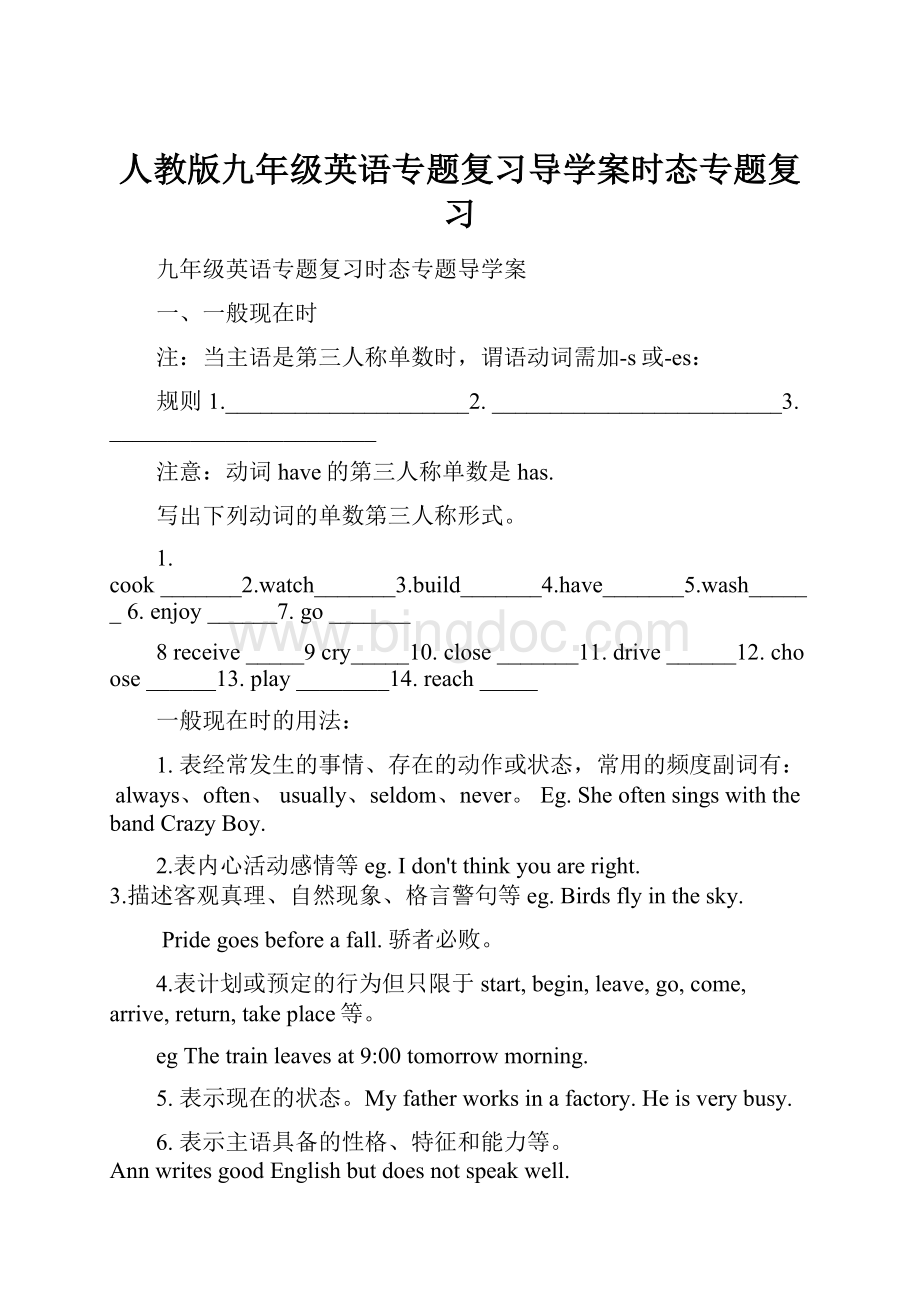人教版九年级英语专题复习导学案时态专题复习Word文件下载.docx
《人教版九年级英语专题复习导学案时态专题复习Word文件下载.docx》由会员分享,可在线阅读,更多相关《人教版九年级英语专题复习导学案时态专题复习Word文件下载.docx(39页珍藏版)》请在冰点文库上搜索。

usually、seldom、never。
Eg.SheoftensingswiththebandCrazyBoy.
2.表内心活动感情等eg.Idon'
tthinkyouareright.
3.描述客观真理、自然现象、格言警句等eg.Birdsflyinthesky.
Pride
goes
before
a
fall.
骄者必败。
4.表计划或预定的行为但只限于start,begin,leave,go,come,arrive,return,take
place等。
egThetrainleavesat9:
00tomorrowmorning.
5.表示现在的状态。
My
father
worksinafactory.He
is
very
busy.
6.表示主语具备的性格、特征和能力等。
Ann
writes
good
English
but
does
not
speak
well.
具体情况(主要用于下面几情况)
1)描述当前时间内经常出现、反复发生的动作或存在的状态。
在这种情景中,句子常带有表示频率的时间状语:
always,everyday,often,onceaweek(month,year,etc.),sometimes,seldom,usually等等,以表示句中的动作或状态是习惯性的、经常性的。
例如:
2.Wegrowbeautifulflowers.(she)
3.Theylikecollectingstamps.(Ben)
4.Ilistentomusiccarefully.(myaunt)
5.Youlikemakingamodelship.(Helen)
3)写出下列动词的相应形式
II.用所给动词的适当形式填空:
1.I_______
_(write)toyouassoonasI_______(get)toLondon.
2.Hedoean'
tfeelwelland____________(noteat)anyfoodthismorning.
3.He_____not______(see)mecomein,forhe______(read)somethingwithgreatinterest.
4.I_________(l;
et)youhavethebookassoonasI_________(finish)it.
5.Whilewe________(wait)forourteacher,alittleboy______(run)uptous.
III单项选择:
1.ThestudentswillgototheSummerPalaceifit_____tomorrow.
A.don'
trainB.doesn'
trainC.won'
train
2.There___anEnglishfilmnextweek.
A.willhaveB.isgoingto
haveC.isgoingtobeD.wasgoingtobe
3.Thepicture_______nice.
A.looksB.islookedC.lookD.islooking
4.She______downandsoonfellasleep.
A.liveB.lainC.laidD.lay
5.They_____theofficeatnineyesterdaymorning.
A.reachedtoB.arrivedC.wentD.getto
6.WeshallgotoShanghaionbusinessbeforeyou_____backnextweek.
A.wilcomeB.cameC.wouldcomeD.come
7.Don'
tsmokeuntiltheplane______off.
A.takesB.
tookC.wastakenD.istake
8.Isawher____theroomthismorning.
A.toenterB.enteredC.enterD.enters
9.theteacheraskedus______toschoolontime.A.tocomeB.comingC.comeD.comes
10.Johnisalways______others.
A.helpB.helpingC.helpsD.tohelp
二、一般过去时
时间状语:
ago,yesterday,thedaybeforeyesterday,lastweek(year,night,month…),in1989,justnow,attheageof5,oneday,longlong等。
2.动词原形以ow/aw结尾,过去式常变为ew。
know—knew,grow—grew,throw—threw,draw—drew等。
但是也有一些例外,例如:
show—showed。
3.许多动词只要将动词原形中的元音字母i改为a,就可变为过去式。
begin—began,give—gave,sing—sang,swim—swam,sit—sat,drink—drank,ring—rang
但是win—won例外。
4.有些动词的过去式以o(a)ught结尾。
bring
—brought,buy—bought,think—thought,catch—caught,teach—taught
上述动词过去式究竟是以ought还是aught结尾,只要记住“有a则a,无a则o”即可。
即:
原形中有a的,过去式变为aught,否则为ought。
5.以eep结尾的动词,常将eep改为ept构成过去式。
keep—kept,sleep—slept,sweep—swept
一般过去时的用法
1)表示过去某个时间所发生的动作或存在的状态。
常和表示过去的时间状语yesterday,lastweek,anhourago,justnow,theotherday,in1982等连用。
在一般过去式中,要表达“过多少时间之后”,一般用after。
Wheredidyougojustnow?
Afterafewyears
shestartedtoplaythepiano.
2)表示在过去,经常或反复发生的动作。
常与often,
always等表示频度的副词连用。
WhenIwasachild,Ioften
playedfootballinthestreet.
3)表示过去连续发生的一系列动作。
Thestudentsgotupearlyinthemorning,didmorningexercisesandthenreadEnglishal
oudintheo
penair.
4)有些发生时间不是很清楚的情况,实际是过
去发生的,也应用过去时态。
Hownicetoseeyouhere!
Ithoughtyouwereout.
另外,还可用过去时表示委婉的语气。
e.g.Couldyoulendmeyourpen?
特殊用法(一般过去时表现在)
(1)在宾语从句中,由于时态呼应的关系,可用一般过去时表示现在:
Ididn’tknowyouwerehere.我不知道你在这儿。
(were实际上
指现在)
Ididn’tknowyouweresobusy.我没想到你这么忙。
(were实际上指现在)
(2)表示客气委婉的现在:
Iwonderedifyouwe
refreethisevening.不知您今晚是否有空。
Ithoughtyoumight
likesomeflowers.我想您也许想要些花。
【注】能这样有的动词主要限于want,wonder,think,hope,intend等少数动词。
(3)用于某些特殊结构中表示现在:
It’stimewestarted.我们该动身了。
I
wishIknewhisname.要是我知道他的名字就好了。
I’dratheryoulivedclosertous.我希望你能住得离我们近点。
【注】该用法
主要用于it’stime,Iwish,I’drather,ifonly,asif,等少数结构后接从句的情形,其中有些结构后面的句子还可用一般过去时表示将来:
I’dratheryoucamenextMonday.我宁愿你下周星期一来。
另外表主观想法的虚拟条件句也用一般过去时表示现在:
IfIhadthemoneynowI’dbuyacar.假若我现在有钱,我就买辆小汽车。
练习:
1.—DidyourbrothergotoAmericalastyear?
—_____
________
A.No,hedidnevergothereB.No,hehasnevergonehereC.No,heneverwasthereD.No,he’sneverbeenthere
2.--I’msorryyouhavemissedthebus.It_________fiveminutesago.
--Whatapity!
A.wasleavingB.hasleftC.leftD.leaves
3.--Mr.Johnson,
wehavefoundyourwatch.--Mywatch!
Thankyou.Where____it?
A.doyoufindB.haveyoufoundC.didyoufindD.wereyoufinding
4.LastweekJohn_____hisleg.A.feltandbro
kenB.fellandbroke C.feelsandbreaksD.fallenandbroken
5.Jack_________histhickcoa
tbecauseitwassnowing.
1、时间,条件状语从句中,从句一般是主将从现。
Ifitdoesn’traintomorrow,we’llgocamping.
2、Therebe结构的一般将来时(近主语原则)
Therewillbe
Thereis/aregoingtobe
主要用来描述将要发生的动作或存在于未来的情况。
这里所说的“将来时间”是指“说话、写文章那一刻以后的时间”。
它的表示方法主要有如下几种:
1)shall/will+动词原形这种表示方法是说,动作在现在或目前还未发生,要在将来的某个时间内发生;
它没有主观性,是“纯粹的将来动作”。
Ishall/willnotbefreetomorrow.我明天没空。
2)be(am/is/are)+going+不定式
这种表示方法主要是说明A)“说话人的意图、打算”;
B)“某种可能性”。
A)HeisgoingtospendhisholidaysinLondon.他打算在伦敦度假。
B)Itisgoingtorainsoon.马上要下雨了。
3)用一般现在时或现在进行时(限于某些动词)表示按计划安排要发生的事。
主要强调“按计划安排要发生的事”。
Theplanetakesoffat11:
00a.m.那架飞机上午十一点起飞。
1.Mr.Smith_______atalkoncountrymusicnextMonday.
3Mary'
sbirthdayisnextMonday,hermother_____(give)herapresent.
4.Itisverycoldthesedays.It______(snow)soon.
5Iamafraidthere______(be)amee
tingthisafternoon.Ican'
tjoinyou.
6.Mike______(believe,not)thisuntilhe______(see)itwithhisowneyes.
7.Mostofusdon'
tthinktheirteam______(win).
四、把下列各句译成英语
1.我叔叔今晚要来。
2.他没有打算住那座小屋。
3.我们要读这本书。
4.-你爸爸要去钓鱼吗?
-不,他要去游泳。
四、过去将来时
tomorrow,nextday(week,month,year…),soon,inafewminutes,by…,thedayaftertomorrow,etc.
基本结构would,was/weregoingto,was/wereto,was/wereaboutto等+do
基本用法
1.宾语从句或间接引语中
egHedidn'
texpectthatwewouldallbethere.
2.表示过去习惯性的动作
egDuringthatperiod,hewoulddothiseveryday.
3.表示过去的愿望、倾向,多用于否定句om]
A)ShetoldmethatshewouldgoontriptoEuropethenextday.
她告诉我,她第二天要去欧洲旅行。
Hedidn'
texpectthatwewouldallbethere.他没料到我们会全在那儿。
B)Dur
ingthatperiod,hewoulddomorningexerciseseveryday.
在那段时间,他每天早锻炼。
Wheneverhehadtime,hewouldhelphismotherwithsomehousework.无论他什么时间有空,他总是帮他妈妈干点家务活。
C)Nomatterhowdifficulttheworkwas,hewouldkeepondoingituntilheaccomplishedit.不管工作有多难,
他总会坚持不懈地把它干完。
练习题I.选择填空
1.LiMingsaidhe_____happyifBrian_____toChinanextmonth.
A.as;
comeB.was;
wouldcome C.wouldbe;
cameD.willbe;
come
2.Jennysaidshe_____herholidayinChina.
A.spentB.wouldspent C.wasgoingtospentD.wouldspend
3.—Whatdidyoursonsayintheletter?
—Hetoldmethathe______theDisney
Worldthenextday.
A.willvisit
B.hasvisited
C.isgoingtovisit
D.wouldvisit
4.IhopedTina______tomybirthdaypartyontimethenextWednesday.
A.tocome
B.iscoming C.willcome
D.wascoming
5.Fathersai
dthathe______metoBeijin
gthenextyear.A.took
B.wouldtakeC.takes
D.willtake
6.Wewerenotsurewhetherthey______morevegetables.
A.aregoingto
g
row
B.weregoingtogrow C.willgrow
D.havegrown
7.She______toworkwhenthetelephonerang.A.isgoing
B.willgo
C.wasabouttogo
D.
istogo
II
.用所给动词的适当形式填空
1.MissZhangsaidshe________(visit)theGreatWallnextsummer.
2.Shetoldhimthatshe______
__(notstay)hereforlong.
3.
Iwasn’tsurewhetherLucy_______(come)thenextyear.
4.Thescientistssaidtheworld’sp
opulation_______(slow)downinfuture
.
5.Shesaidtheb
us_______(leave)atfivethenextmorning.
6.Iwasn'
tsurewhetherhe_______(lend)mehisbookthenextmorning.
7.Hewasfifty-six.Intwoyearshe_______(be)fifty-eight.
8.Whenevershehas
time,she______(help)themintheirwork.
五、现在进行时
now,atthistime,thesedays,etc.
动词V-ing的构成形式
1.____________________________________2.____________________________________
3.____________________________________4.____________________________________
写出下列动词的现在分词形式。
1、shop
2、relax
3、jump
4、make
5、have
6、talk
7、tie
8、run
9、swim
10、cry
11、come
12、watch
现在进行时的用法:
1)表示现在(指说话人说话时)正在发生或进行的动作。
常与now,rightnow,atthis
moment等时间状语连用。
例如:
Wearewaitingforyounow.我们正在等你。
2)表示现阶段(说话前后一段时间内),一直在进行的活动。
说话时动作未必正在进行。
Mr.Greeniswritinganothernovel.他在写另一部小说。
(说话时并未在写,只处于写作的状态。
)
Heisthinkingaboutthisproblemthesedays.这些天来他一直在考虑这个问题。
3)表示反复发生的动作或持续存在的状
态,常与always,constantly,forever等词连用,往往带有说话人的赞许、批评等主观色彩。
Youarealwayschangingyourmind.你老是改变主意。
4)表示渐变,这样的动词有:
get,grow,become,turn,run,go,begin等。
Theleavesareturningred.叶子在变红。
It'
sgettingwarmerandwarmer.
天越来越热了。
5)表示一个在最近按计划或安排要进行的动作。
多有一个表示未来时间的状语。
这种情况仅限于少量动词,如:
go,come,leave,arrive,see,have,lunch(吃午饭),return,dine(进餐,尤指晚餐),work,sleep,stay,play,do,wear(穿,戴)等。
等。
--Tom,
supper
rea